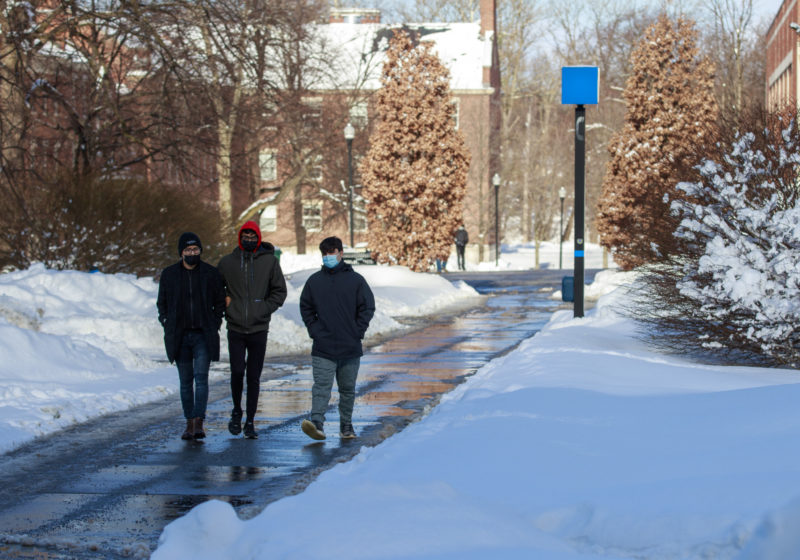Assistant Professor of Brain and Cognitive Sciences Jude Mitchell is under review after denying a student an excused absence on Tuesday, Feb. 1, the Lunar New Year.
Also called the Spring Festival, the Lunar New Year is a two-week celebration of the beginning of the Lunisolar calendar’s new year, an event primarily associated with several Southeast Asian cultures. For many, the most important period of this celebration is New Year’s Eve (this year, Jan. 31) and New Year’s Day (Feb. 1).
While University policy leaves absences for culturally significant holidays like this one up to professor discretion, the decision and the email interactions between Mitchell and senior Brendon Tran resulted in a Bias Incident Report being filed.
According to University Policy and New York State Law, students have an explicitly protected right to move academic duties off of days of religious importance. But due to western standards of religion classifying the holiday as primarily cultural, the Lunar New Year is not protected by either the state or the University.
But for some, including Tran, the Lunar New Year is a religious holiday. As a Vietnamese-American coming from a family of Buddhists, Tran said the day holds both important cultural and religious significance for him.
“Growing up, I’ve always known that the Lunar New Year is the most important holiday for [my family],” he said. “ We got together more often, or more of us, for Lunar New Year’s than Christmas itself […] It was all the families, all the aunts and uncles, family friends — it was a giant party. This is extremely important to us, especially being in a very big Buddhist family […] I haven’t been able to celebrate Lunar New Years with my own family in — since I started college. And then COVID[-19] hit and now I still haven’t been able to celebrate it.”
This holiday also isn’t just Buddhist-centric, Tran continued.
“I know at least three different religions that celebrate it as one of their most important days of the year,” Tran said, citing Daoism, Confucianism, and Buddhism. “I don’t know much about the other two, but I grew up Buddhist, I have friends who are Buddhist, and we all celebrate New Year’s. Yes, it obviously is cultural, but I have friends who are also white whose families are Buddhist who also celebrate it […] It should be on the list either way.”
On Saturday, Jan. 29, Tran emailed his instructors concerning a lab, stating that he would be unable to attend due to the Lunar New Year. While Tran was initially given approval by one instructor to sit in on a different lab session, he quickly received an email from Mitchell, who cited a need to create a uniform policy.
“While I respect your decision to celebrate the holiday, it is not a [U]niversity holiday,” Mitchell wrote, denying Tran’s request for accommodations. “Many other students might also like to celebrate that day, which raises an issue in terms of having a uniform policy.”
Tran said that this argument confused him. “I don’t even understand the logic behind it,” he told the Campus Times in an interview. “If other students want to celebrate, what’s the problem?”
When asked for comment, Mitchell stated that “everything I had to say to Brendon and my reasoning for the decision were pretty complete in my email exchange with him.”
Mitchell also raised a logistic issue that would arise if Tran switched lab sessions. “To have you attend another section would mean that a workbench that normally sits four students would have to take a fifth student, which could be a detriment to the other students attending at their regular time.”
This argument also did not hold much weight to Tran. “I don’t know if that means that he isn’t willing to pull up a chair at a four-person table?” he said.
Upon receiving this rejection, Tran turned to other areas of the University. He submitted a Comment and Complaint form, an online resource for undergraduates in the College of Arts, Sciences, and Engineering (AS&E) who “wish to raise an academic concern or believe they have received unfair treatment in an academic matter.”
On the next business day, Monday, Jan. 31, Tran received a response from Marcy Kraus, the Suzanne Jagel O’Brien Director of the College Center for Advising Services.
“Faculty are encouraged to consult this calendar to avoid potential scheduling conflicts for exams and other course activities,” the email read, stating that exemptions for other holidays are up to professor discretion. Kraus acknowledged that the response would be disappointing to Tran, and said that she passed Tran’s complaint along to Molly Morrison, the Assistant Dean for International Affairs, in case Morrison had any additional information.
After receiving confirmation that Mitchell’s actions fell within existing University policies, Tran reached out to Mitchell, asking him to reconsider, further explaining why the holiday was important to him.
He said that the instructors had previously encouraged students with sports conflicts to reach out for accomodations, and argued that it wasn’t fair the same policy did not apply to cultural holidays. Tran said he’d felt like Mitchell’s policy was unreasonable given the importance of the holiday.
“Westerners get basically a week off for New Year’s,” he told CT. “Normally, Lunar New Year’s is a fifteen-day celebration. I’m not asking for fifteen days. I’m asking for one.”
Mitchell responded to Tran’s email an hour later, reaffirming his rejection, stating that the issue would require a University-wide policy change, as “a significant fraction of students might want to celebrate this day, not just you.”
When asked by the CT how many students requested exemptions to Mitchell or his co-instructors, Mitchell said that Tran had been the only one.
“However, if I had granted the exception to him, then I feel it would have been necessary to grant the exemption to any other students that might come forward and wish to celebrate that day, in order to provide a uniform policy for students,” Mitchell wrote. “Thus moving forward in the semester, any other culturally relevant holiday that is not a [U]niversity holiday would be possible for a student to request as an exemption. As you will see in my response to Brendon, this would create a serious problem for this course because it is a laboratory with limited space ([four] workbenches each sitting [four] students in each section, and each section is completely full). It is not practical to accommodate students switching to alternate days this semester, and although we can provide on-line alternative[s] when necessary (i.e., COVID[-19] exemptions or illness), an on-line course is not an equivalent laboratory experience.”
In his email to Tran, Mitchell also drew a distinction between cultural holidays and other types of event accommodation requests. “We often accommodate students who have medical school interviews or University-sponsored extracurricular events, but those are not holidays or celebrations, they are students participating in an activity to better themselves and compete to prove their abilities. That is not equivalent to taking a holiday.”
Mitchell acknowledged that religious holidays “are selected somewhat arbitrarily, but this issue needs to be addressed at the higher [U]niversity level, not by professors individually granting exceptions, because those exceptions potentially would impact many students if applied uniformly.”
Outside of UR, discussions to add the Lunar New Year to the roster of publicly-acknowledged holidays has gained traction in recent years. Since 2016, New York City public schools have recognized the holiday with a day off from school. This past Monday, a bill to add the Lunar New Year to the current list of 11 federal holidays was introduced to the House of Representatives.
When asked for comment on the interaction between Tran and Mitchell, Dean for Diversity in AS&E Beth Olivares said she was aware of the issue, and a bias incident report had been filed that is currently under investigation. She declined to comment any further.
The Lunar New Year will be discussed at the next College Diversity Roundtable Meeting on Friday, Feb. 11, according to Jessica Guzmán-Rea, Assistant Dean for Diversity and Director of the Paul J. Burgett Intercultural Center.
For Tran, his frustrations culminated when he saw that the University made an Instagram post wishing a “healthy and prosperous Lunar New Year and Year of the Tiger to everyone celebrating!”
These frustrations were echoed by over 30 comments on the post decrying UR. Many comments called the post “performative,” citing difficulties students faced trying to celebrate.
“u looove our culture when it benefits ur diversity narrative but won’t support us when it actual matters. how are we suppose to celebrate when your faculty refuses to respect the holiday and provide accommodations?” junior Alex Fegler commented.
“Celebrating [Lunar New Years] is also a form of me showing everyone that I am so proud of my background, my heritage, my culture,” Tran said. “So proud of being a Vietnamese-American, or more Vietnamese anyway, and that I’m not going to shame or hide it. And when the University’s like, ‘No, you can’t do that,’ it just felt like if the roles were reversed, you wouldn’t expect professors to be like ‘No, you have to be here on New Year’s. You have to be here on Christmas.’ These things hold such significance to you, why can’t you understand that certain holidays hold significance for us? It’s just so disrespectful.”





